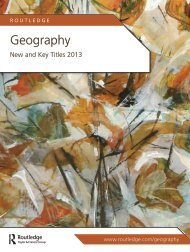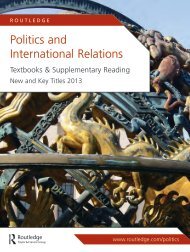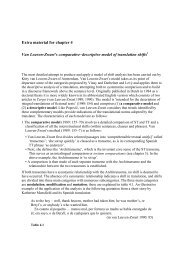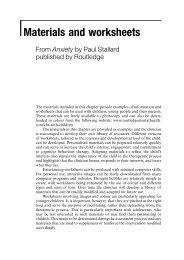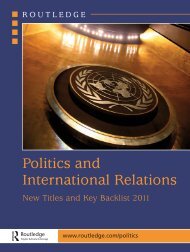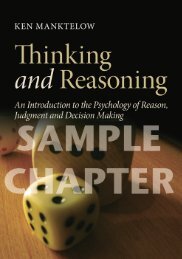Easily na - Routledge
Easily na - Routledge
Easily na - Routledge
You also want an ePaper? Increase the reach of your titles
YUMPU automatically turns print PDFs into web optimized ePapers that Google loves.
Forthcoming in 2011<br />
Beyond Anti-Americanism<br />
The Case for Criticism not Prejudice<br />
Brendon O’Connor, Griffith University, Australia<br />
Beyond Anti-Americanism presents a case for seeing<br />
anti-Americanism as principally a counterproductive<br />
prejudice. Brendon O’Connor argues that while there are<br />
many reasons to be frustrated with American policies,<br />
politics and even American society, a crucial distinction<br />
should be drawn between criticism and prejudice.<br />
Selected Contents: Introduction: What is Anti-Americanism?<br />
1. The Anti-American Tradition 2. American Power and<br />
Complicating the Anti-American Tradition 3. George W.<br />
Bush and the Resurgence of the Anti-American Tradition<br />
4. Violent Anti-Americanism: bin Laden, al Qaeda and<br />
Terrorism Conclusion: Beyond the Anti-American Tradition<br />
June 2011: 234 x 156: 208pp<br />
Hb: 978-0-415-47428-3: £75.00<br />
Pb: 978-0-415-47429-0: £22.99<br />
For more information, visit:<br />
www.routledge.com/9780415474290<br />
Forthcoming<br />
Constructing US Foreign Policy<br />
The Curious Case of Cuba<br />
David Bernell, Oregon State University, USA<br />
This book addresses the roots of the hostility that has<br />
characterized the United States’ relationship with Cuba<br />
and has persisted for decades, even in the wake of the<br />
end of the Cold War. It answers the question of why<br />
America’s Cold War era policy toward Cuba has not<br />
substantially changed, despite a radically changed<br />
inter<strong>na</strong>tio<strong>na</strong>l environment.<br />
Selected Contents: 1. Introduction 2. Imagining Latin<br />
America and Cuba 3. Constructing Reagan’s Castro<br />
4. Waiting for Fidel 5. Conclusion<br />
January 2011: 234 x 156: 208pp<br />
Hb: 978-0-415-78067-4: £75.00<br />
For more information, visit:<br />
www.routledge.com/9780415780674<br />
new<br />
Neoconservatism and<br />
American Foreign Policy<br />
A Critical A<strong>na</strong>lysis<br />
Danny Cooper, Griffith University, Australia<br />
At the time of America’s 2003 invasion of Iraq, the term<br />
’neoconservative’ was enjoying wide currency. To this<br />
day, it remains a term that engenders much debate and<br />
visceral reaction. Exploring the historical significance of<br />
this ongoing movement and its impact on American<br />
foreign policy traditions, this book will be of great interest<br />
to all scholars of foreign policy, American politics and<br />
American history.<br />
Selected Contents: 1. Introduction 2. Neoconservatism<br />
and its Authors 3. Neocons and the Idea of Human Rights<br />
4. The Neocons and the War of Ideology 5. Neocons,<br />
Preponderance and Order 6. Neocons, American Power<br />
and Preventive War 7. Conclusion<br />
October 2010: 234 x 156: 224pp<br />
Hb: 978-0-415-59221-5: £75.00<br />
eBook: 978-0-203-84052-8<br />
For more information, visit:<br />
www.routledge.com/9780415592215<br />
Textbook<br />
Soft Power and<br />
US Foreign Policy<br />
Theoretical, Historical and Contemporary<br />
Perspectives<br />
Edited by Inderjeet Parmar, University of<br />
Manchester, UK and Michael Cox<br />
The rise of widespread negative<br />
attitudes towards US foreign<br />
policy, especially due to the<br />
war of aggression against Iraq<br />
and the subsequent military<br />
occupation of the country –<br />
has brought new attention to<br />
the meaning and instruments<br />
of soft power. In this edited<br />
collection, an outstanding line<br />
up of contributors provides the<br />
most extensive discussion of<br />
soft power to date.<br />
Soft Power has become part of popular political discourse<br />
since it was coined by Harvard’s Joseph Nye, and this<br />
volume features a brand new chapter by Nye outlining his<br />
views on soft, hard and smart power and offers a critique<br />
of the Bush administration’s i<strong>na</strong>dequacies. He then goes<br />
on to examine the challenges for the incoming US<br />
president. The other contributions to the volume respond<br />
to Nye’s views from a range of theoretical, historical and<br />
policy perspectives giving new insights in to both soft<br />
power and the concept of power itself.<br />
Selected Contents: Introduction Inderjeet Parmar and<br />
Michael Cox 1. The Future of Soft Power in US Foreign Policy<br />
Joseph Nye Jr. 2. From Hegemony to Soft Power Geraldo<br />
Zahran and Leo<strong>na</strong>rdo Ramos 3. Soft Power and Strategy:<br />
Developing a ’Strategic’ Concept of Power Edward Lock<br />
4. The Unbearable Lightness of Soft Power Christopher Layne<br />
5. The Power Game, Soft Power and the Inter<strong>na</strong>tio<strong>na</strong>l<br />
Historian Till Geiger 6. Challenging Elite Anti-Americanism in<br />
the Cold War Inderjeet Parmar 7. Technological Leadership<br />
and American Soft Power John Krige 8. The Military Use of<br />
Soft Power – Information Campaigns: The Challenge of<br />
Application, their Audiences and Effects Angus Taverner<br />
9. Public Diplomacy and the Information War on Terror<br />
Philip Taylor 10. Soft Power in an Era of US Decline Giles<br />
Scott-Smith 11. Cheques and Balances: The EU’s Soft Power<br />
Strategy Christopher Hill 12. The Myth and Reality of Chi<strong>na</strong>’s<br />
Soft Power Shogo Suzuki 13. Responding to my Critics and<br />
Concluding Thoughts Joseph Nye<br />
March 2010: 234 x 156: 256pp<br />
Hb: 978-0-415-49203-4: £80.00<br />
Pb: 978-0-415-49204-1: £25.99<br />
eBook: 978-0-203-85649-9<br />
For more information, visit:<br />
www.routledge.com/9780415492041<br />
Browse and order online: www.routledge.com/securitystudies<br />
new<br />
ForeigN PoliCy 21<br />
The US Public and American<br />
Foreign Policy<br />
Edited by Andrew Johnstone, University of<br />
Leicester, UK and Helen Laville, University of<br />
Birmingham, UK<br />
Though often overlooked, public opinion has always<br />
played a significant role in the development and<br />
promotion of US foreign policy and this work seeks to<br />
comprehensively assess the impact and <strong>na</strong>ture of that<br />
opinion through a collection of historical and<br />
contemporary essays.<br />
Selected Contents: 1. Introduction Andrew Johnstone and<br />
Helen Laville Section 1: The Public and War 2. From Coast<br />
Defence to Embalmed Beef: The Influence of the Press and<br />
Public Opinion on McKinley’s Policymaking during the<br />
Spanish-American War Joseph Smith 3. To Mobilize a Nation:<br />
Citizens Organizations and Intervention and on the Eve of<br />
WWII Andrew Johnstone 4. Power to the People? American<br />
Public Opinion and the Viet<strong>na</strong>m War Andrew Priest Section<br />
2: Public Interests and Ideology 5. Organized Labor and<br />
the Social Foundations of American Diplomacy, 1898-1920<br />
Rhodri Jeffreys-Jones 6. Religion and World Order at the<br />
Dawn of the American Century Andrew Preston 7. Gender<br />
Apartheid? American Women and Women’s Rights in<br />
American Foreign Policy Helen Laville Section 3: Interests<br />
and Ethnicity 8. African Americans and US Foreign Policy:<br />
The American Negro Leadership Conference on Africa and<br />
the Rhodesian Crisis Carl P. Watts 9. The American Public<br />
and the US-Israeli ’Special’ Relationship Elizabeth Stephens<br />
10. The Cuban Lobby and US Policy toward Cuba Jessica<br />
Gibbs Section 4: The Public and the War on Terror<br />
11. Neoconservatism and the American Public: Was 9/11<br />
a Hegemonic Moment? Maria Ryan 12. ’You Don’t Launch<br />
a Marketing Campaign in August’: The Bush Administration<br />
and the Public Before and After the Iraq Invasion Scott Lucas<br />
June 2010: 234 x 156: 232pp<br />
Hb: 978-0-415-55315-5: £75.00<br />
eBook: 978-0-203-84927-9<br />
For more information, visit:<br />
www.routledge.com/9780415553155<br />
Forthcoming<br />
US Policy Towards Cuba<br />
Since the Cold War<br />
Jessica Gibbs, Aberystwyth University, UK<br />
This is a comprehensive exami<strong>na</strong>tion of US policy<br />
towards Cuba with a particular emphasis on the<br />
post-Cold War era. As well as providing a detailed<br />
account of US policy and actions towards Castro’s<br />
regime, Jessica Gibbs also illustrates how this case study<br />
provides a revealing insight into wider debates about US<br />
foreign policy and inter<strong>na</strong>tio<strong>na</strong>l relations theory.<br />
Selected Contents: 1. The United States and Cuba: From the<br />
Cuban Revolution to the Fall of the Berlin Wall 2. The Cuban<br />
Democracy Act: ‘Putting the Hammer down on Fidel Castro’?<br />
3. Continuity and Change under Clinton 4. The Rafter Crisis<br />
of 1994 5. The Helms-Burton Act: ‘Adios Fidel’? 6. The<br />
Transformation of the Anti-Embargo Movement 7. The Elian<br />
Gonzalez Case: ‘We won’t Forget, We Vote’ 8. George W.<br />
Bush: Champion of the Anti-Castro Cause? 9. Conclusion<br />
November 2010: 234 x 156: 208pp<br />
Hb: 978-0-415-43747-9: £75.00<br />
eBook: 978-0-203-94612-1<br />
For more information, visit:<br />
www.routledge.com/9780415437479



